- Home
- Mary Downing Hahn
All the Lovely Bad Ones
All the Lovely Bad Ones Read online
All the Lovely Bad Ones
Mary Downing Hahn
* * *
Sandpiper
HOUGHTON MIFFLIN HARCOURT
BOSTON NEW YORK
Other novels by MARY DOWNING HAHN
Closed for the Season
Deep and Dark and Dangerous
Witch Catcher
The Old Willis Place
Hear the Wind Blow
Anna on the Farm
Promises to the Dead
Anna All Year Round
As Ever, Gordy
The Gentleman Outlaw and Me—Eli
Look for Me by Moonlight
Time for Andrew
The Wind Blows Backward
Stepping on the Cracks
The Dead Man in Indian Creek
The Doll in the Garden
Tallahassee Higgins
Wait Till Helen Comes
Daphne’s Book
* * *
* * *
Copyright © 2008 by Mary Downing Hahn
The poem from which the title of this book is taken was written in 1885 by James Whitcomb Riley (1849-1916). It is popularly known as "Little Orphant Annie," but its original title was "The Elf-Child."
The text of this book is set in Aldus Roman.
All rights reserved. Published in the United States by Sandpiper, an imprint of Houghton Mifflin Harcourt Publishing Company. Originally published in hardcover in the United States by Clarion, an imprint of Houghton Mifflin Harcourt Publishing Company, 2008.
SANDPIPER and the SANDPIPER logo are trademarks of Houghton Mifflin Harcourt Publishing Company.
For information about permission to reproduce selections from this book, write to Permissions, Houghton Mifflin Harcourt Publishing Company, 215 Park Avenue South, New York, New York 10003.
www.sandpiperbooks.com
The Library of Congress has cataloged the hardcover edition as follows:
Hahn, Mary Downing.
All the lovely bad ones: a ghost story / by Mary Downing Hahn.
p. cm.
Summary: While spending the summer at their grandmother's Vermont inn, two prankster siblings awaken young ghosts from the inn's distant past who refuse to "rest in peace."
[1. Ghosts—Fiction. 2. Haunted houses—Fiction. 3. Brothers and sisters—Fiction. 4. Hotels, motels, etc.—Fiction. 5. Behavior—Fiction. 6. Vermont—Fiction.] I. Title.
PZ7.H1256Al 2008
[Fic]—dc22
2007037932
ISBN: 978-0-618-85467-7
ISBN: 978-0-547-24878-3 pb
Manufactured in the United States of America
DOM 10 9 8 7 6 5 4 3 2 1
* * *
To all the little children:—The happy ones; and sad ones;
The sober and the silent ones; the boisterous and glad ones;
The good ones—Yes, the good ones, too; and all the lovely bad ones.
—James Whitcomb Riley, dedication to "Little Orphant Annie"
1
Grandmother met us at the Burlington airport, a big smile on her face and her arms open for a hug. With a squeal of delight, my sister rushed toward her, but I held back. Public displays of affection were okay for girls, I guessed, but not for guys. After all, I'd be thirteen soon—way too old for that kind of silly stuff.
After giving Corey a big hug, Grandmother turned to me. "Just look at you, Travis. You've shot up since Christmas. How tall are you?"
I shrugged. "About five six, maybe seven. Not all that tall. There's a guy in my class who's already six feet."
"I'm almost as tall as Travis," Corey put in, never one to be left out. "And I'm a whole year younger."
While Corey chattered about the plane ride from New York, Grandmother led us to the baggage claim. We grabbed our suitcases and headed for the parking lot. The late-afternoon air was cool and the sky was blue, a change from the heat and humidity we'd left in the city.
"Welcome to Vermont." Grandmother opened the door of a shiny red pickup truck. "Toss your luggage in the back and climb aboard."
Corey jumped in beside Grandmother, and I squeezed in by the door.
"So do you think you'll be able to stand being away from your parents for a whole summer?" Grandmother asked.
My sister and I looked at each other and grinned. "We'll miss them a little," Corey said, "but we're used to summers away from home."
Grandmother smiled. "I'm glad you chose the inn instead of camp."
Corey and I didn't look at each for fear we'd laugh and give ourselves away. We hadn't had a choice, actually. Camp Willow Tree had made it very clear that neither Corey nor I was welcome to return. It seemed we'd failed to get into the true spirit of camp. We'd started food fights, played hooky from evening campfire, made up rude words to the camp song, overturned a canoe on purpose, and let the air out of a counselor's bike tires the day we were supposed to ride twenty miles up a mountain in the pouring rain. Was it our fault the camp staff had no sense of humor?
The truth of it was Corey and I tended to get in trouble wherever we went. Bad ones—that's what we were. Well, not really bad. We preferred to think of ourselves as pranksters. But like the camp staff, adults (including Mom and Dad) didn't find our antics as funny as we did.
Our parents had made us promise to behave ourselves at the inn. One bad report from Grandmother and we'd spend the rest of our vacation taking pre-algebra in summer school—a fate even worse than camp craft projects involving Popsicle sticks and feathers.
Just before the turnoff for Middlebury, we left Route 7 and took a winding road that rolled over hills, past farms and fields, red barns and sturdy farmhouses. Herds of black and white cows raised their heads to watch us go by. Beyond them, the mountains rose greenish blue against the sky.
"Here we are." Grandmother pointed to a neatly painted sign: THE INN AT FOX HILL—NEXT RIGHT. Under the words was a picture of a smiling fox. A VACANCY sign hung below.
Grandmother swung into a long, straight driveway shaded by tall trees. At its end was a three-story pink brick building. The late-afternoon sun touched everything with gold—the lawn, flower beds, and wooden rocking chairs on the front porch. Behind the inn, clouds cast their shadows on the Green Mountains.
Grandmother parked the truck, and Corey and I jumped out. I grabbed for my suitcase, but Grandmother said, "Leave your luggage for now. Henry can bring it in later. Martha's promised to have a pitcher of ice-cold lemonade, freshly squeezed, and a plateful of chocolate-chip cookies, still warm from the oven."
We followed Grandmother down a stone path bordered with dense white flowers to a brick patio shaded by a huge wisteria climbing over a trellis. Nearby, a fountain splashed into a pool, and I glimpsed flashes of red fish swimming in its depths. Flowers bloomed everywhere, and bees hummed. Birds called back and forth in the trees.
As we settled ourselves around a table, a woman strode toward us carrying a tray. Her gray hair was pulled back tightly into a knot, and her mouth seemed to have settled into a permanent frown. Without so much as a smile, she set the tray down and stepped back. "Thank you, Martha. It looks lovely." Gesturing to Corey and me, Grandmother introduced us to the woman.
"Pleased to meet you." Still no smile, just a quick dip of the head.
"Mrs. Brewster is our cook," Grandmother told us. "People come to the inn year after year just to eat her famous blueberry pie."
Another dip of the head and Mrs. Brewster left us to enjoy the lemonade and cookies.
"Martha's a little standoffish," Grandmother admitted, "but she and her husband more or less came with the inn. And she's truly magnificent in the kitchen."
Corey jabbed my ankle with the toe of her shoe and whispered, "She looks like an old grump to me.
"
Grandmother leaned across the table to brush a strand of hair out of Corey's eyes. "You'll change your mind when you eat your first meal here."
Corey helped herself to a cookie. While she chewed, she looked around. "Is that a swimming pool?"
Grandmother nodded. "You can use it any time you like—as long as someone's with you. I don't have a lifeguard."
She pointed past the pool to the wide grassy lawn, dotted with old-fashioned Adirondack chairs, turned to face the mountains. "If you like tennis, the court's over there. I have bicycles for the guests. The state park just down the road has a great network of biking and hiking trails."
Grandmother ate a cookie. "If it rains," she went on, "there's a library, computer, TV, DVD player, and at least a dozen old-fashioned board games. Hopefully, you'll find plenty to do."
Corey and I leaned back in our chairs and drank our lemonade, just as fresh and cold as Grandmother had promised. It looked as if it was going to be a good summer. No schedules. No organized activities. Nobody blowing whistles at us. No boring crafts. For once, we were free to do what we wanted to do. Including nothing. Nothing at all.
Corey studied the inn. "Do you have many guests?"
"There are six rooms," Grandmother said. "Four on the second floor and two on the third. We can house twelve guests, but tonight we only have two—a couple of young men."
Corey looked around. "Where are they?"
"They've gone out bicycling, but they'll be back soon for dinner."
"You must usually have more people than that," Corey said.
Grandmother sighed. "That's what I thought when I bought the place, but the inn's kind of remote. Tourists like to be closer to Burlington or Middlebury, Stowe or Woodstock." She shifted in her chair as if she were about to get up but then changed her mind.
"Actually, the inn's location is only part of the problem," she added slowly.
Corey and I sat up straighter, as if we both sensed something exciting.
For a moment, Grandmother stared at the inn, her gaze drifting from one window to the next as if she were admiring the flower boxes.
"I wouldn't bother telling you," she said at last, "but you're sure to hear the guests talking about it. Fox Hill is mentioned in Haunted Inns of Vermont!" Corey and I leaned closer, our eyes wide. A little shiver raced up and down my spine. A whole summer in a haunted inn—what could be more exciting than that?
"Oooh," Corey murmured. "I've always wanted to see a ghost."
"Don't be stupid," I told her. "You can't even watch a horror movie without having nightmares."
"Huh," Corey said. "Just last week I watched one of the Scream movies, and I didn't even close my eyes or cover my ears once!"
"Don't worry." Grandmother patted Corey's hand. "No one has seen a ghost since the Cornells sold the inn to me."
"Where do you think they went?" Corey asked.
"To North Carolina, I think," Grandmother said. "They wanted to open an inn at the beach."
"Not the Cornells," I said. "The ghosts. Where did they go?"
Grandmother shrugged. "In my opinion, they were never here in the first place."
"You don't believe in ghosts?" Corey looked surprised.
"Of course not." Grandmother laughed. "But sometimes I find myself wishing they'd come back. Business might improve."
"What do you mean?" I asked.
"You'd be surprised how many people come here because of that stupid book," Grandmother said. "Then they leave in a huff because they didn't see a ghost. Some even want their money back."
"Do you have the book?" I asked.
"Of course." Grandmother got up and led us into the inn, through the kitchen, and down a hall to a large room in the front of the house. "The library," she said.
Tall windows let in long bars of afternoon light. Several pairs of soft leather armchairs flanked the windows. A matching sofa stood near the door. In front of it was a low table covered with magazines. Books crammed the shelves built into the walls.
Grandmother picked up a thick, well-read paperback and handed it to me. "Page 103," she said.
I sat down on the sofa, and Corey perched beside me. I opened the book to page 103.
The Inn at Fox Hill was built in the late 1700s. Originally a private home, it has changed hands many times. Although I checked old records, the inn's history is sketchy at best. Apparently, it served several purposes—among them, a boardinghouse, a tuberculosis sanitarium, a private school. In 1940, the place was abandoned. For fifteen years, it stood vacant. Weather, neglect, and vandals took their toll. Smothered in ivy and surrounded by weeds, the mansion was soon reduced to a shell of its former self. To passersby, it was the very image of a haunted house.
In 1955, Mr. and Mrs. Stephen Cornell, young vacationers from Boston, saw the building and recognized its potential. They spent more than ten years restoring the house and grounds. In 1967, the Inn at Fox Hill opened for business.
Soon the Cornells began receiving complaints from guests. A woman in a long white dress roamed the grounds at night, moaning so loudly she woke them up. Others were kept awake by noisy children playing in the halls. Many reported hearing footsteps on the stairs, banging doors, barking dogs, sobs, and laughter. Lights and radios came on in the middle of the night. Water gushed from faucets. Toilets flushed continually. The power went off for no reason—and came back on again for no reason.
Rather amusingly, one woman was especially indignant about an impudent child who called her "Fatso" but who ran away before she got a good look at him. More seriously, several guests complained of theft—watches, rings, jewelry, and the like disappeared from drawers and bedside tables.
Mr. and Mrs. Cornell were as mystified as their guests. They investigated the plumbing and the wiring; they kept doors locked at night; they even hired a night watchman. Nothing helped. The incidents continued.
Soon psychics descended on Fox Hill, followed by ghost hunters with special cameras and recorders. The experts agreed: Ghosts roamed the halls of the inn.
As we all know, some people are sensitive to the presence of ghosts. Others are not. If you want to test yourself, spend a night or two at the Inn at Fox Hill. I did ... and I was not disappointed! When I woke, the cheap ring I'd left deliberately on the bedside table was gone.
And remember, even if you don't see a ghost, you'll enjoy the Cornells' hospitality, the inn's charm, the fresh Vermont air, the gorgeous scenery, and the meals prepared by the cook in residence, the excellent Mrs. Martha Brewster, a rare marvel.
I closed the book and stared at Grandmother. "Are you sure," I began, but she cut me off with a wave of her hand.
"It's absolute nonsense." She shook her head disdainfully and returned the book to the shelf. "Five thirty," she said. "Time for dinner."
As Corey and I followed Grandmother out of the library, we glanced at each other. Without saying a word, I knew my sister was thinking exactly what I was thinking. Rappings and tappings, footsteps, doors opening and shutting—we could do that. And more. Bringing ghosts back to Fox Hill would be like playing haunted house all summer long.
2
The dining room was large enough for at least two dozen people, but only two other tables were occupied. The bike riders sat together by the French doors, open to a view of the mountains. Lean, sunburned guys with huge leg muscles, they didn't look as if they'd come to Vermont to see ghosts.
At another table were Mr. and Mrs. Jennings, who'd showed up just before dinner, wanting a room. They were old but not old old—probably forty or fifty. His hair was gray, and hers was an odd shade of tan (dyed, according to Corey). He wore hiking shorts, a navy T-shirt, and walking sandals over rag-wool socks. "He doesn't want people to see his ugly toes," Corey whispered.
Mrs. Jennings wore shorts and a flowered T-shirt and sandals without socks, showing her perfect red lacquered nails.
All in all, they looked pretty fit for their age, but I doubted they'd come to Vermont to bike or hike. Corey g
uessed they were antique collectors in search of rusty farm tools to put in their flower garden.
Then we noticed they were reading Haunted Inns of Vermont. Grandmother pointedly ignored their taste in literature, but Corey kicked me under the table to make sure I'd noticed.
As promised, the grim and silent Mrs. Brewster produced a great meal: spicy chicken served on rice with some vegetables I shoved aside, a basket of freshly baked rolls, and a salad.
A blonde with a freckled nose served us. She looked about sixteen, I thought. Probably in high school. She was really cute, just the kind of girlfriend I hoped to have someday.
"Tracy," Grandmother said, "these are my grandchildren, Travis and Corey. They'll be here all summer." Smiling at us, she added, "I don't know what I'd do without Tracy. She serves meals, washes dishes, and keeps the inn clean and tidy."
"You'll love it here." Tracy leaned a little closer to Corey and me. "The inn's supposed to be haunted, but so far I haven't seen a thing. Kind of disappointing, actually. I was hoping to have some scary stories to tell when I go back to school."
Grandmother shook her head. "I thought you had better sense."
"I know you don't believe in ghosts, Mrs. Donovan," Tracy said. "But you can't prove they don't exist."
"You can't prove they do exist, either," Grandmother pointed out.
"Well, why not give them the benefit of the doubt?" Corey asked. "It makes things more interesting."
"That's enough silly talk." Grandmother frowned at Corey's plate. "Eat your dinner before it gets cold."
Tracy left to refill the bike riders' water glasses, and I dug into my dinner, washing it down with gallons of iced tea and topping it off with peach cobbler à la mode. Except for the vegetables, it might have been the best meal I'd ever eaten. Corey ate most of hers, which was amazing. Usually she picks at her food, which drives Mom and Dad insane. If she doesn't eat enough, they worry she's anorexic. If she eats too much, they worry she's bulimic. I think she just likes the attention.
After dinner, Grandmother dropped into a rocking chair on the porch and gazed at the mountains. The trees cast long shadows toward the inn. High in the sky, swallows dipped and soared, catching bugs on the fly.

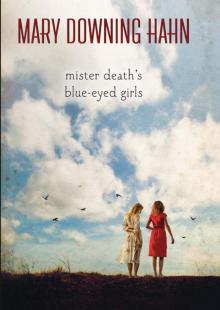 Mister Death's Blue-Eyed Girls
Mister Death's Blue-Eyed Girls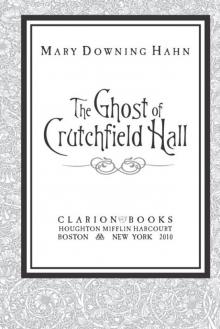 The Ghost of Crutchfield Hall
The Ghost of Crutchfield Hall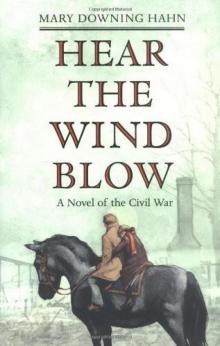 Hear the Wind Blow
Hear the Wind Blow Time of the Witch
Time of the Witch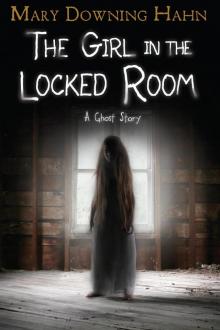 The Girl in the Locked Room: A Ghost Story
The Girl in the Locked Room: A Ghost Story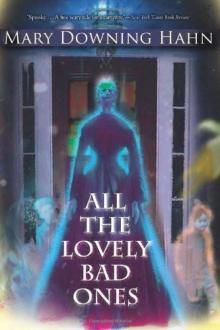 All the Lovely Bad Ones
All the Lovely Bad Ones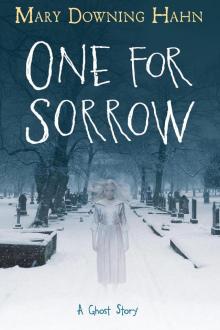 One for Sorrow
One for Sorrow Deep and Dark and Dangerous
Deep and Dark and Dangerous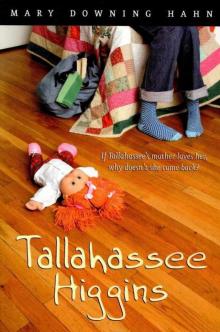 Tallahassee Higgins
Tallahassee Higgins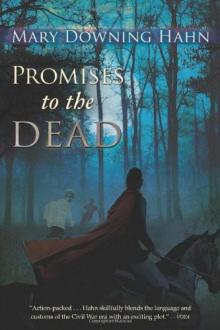 Promises to the Dead
Promises to the Dead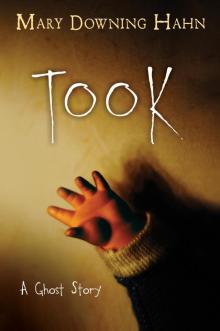 Took: A Ghost Story
Took: A Ghost Story Following My Own Footsteps
Following My Own Footsteps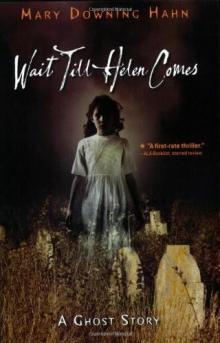 Wait Till Helen Comes: A Ghost Story
Wait Till Helen Comes: A Ghost Story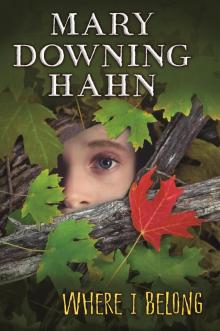 Where I Belong
Where I Belong The Spanish Kidnapping Disaster
The Spanish Kidnapping Disaster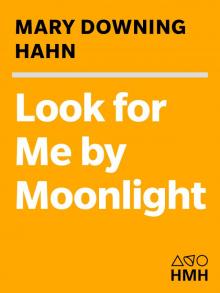 Look for Me by Moonlight
Look for Me by Moonlight The Old Willis Place
The Old Willis Place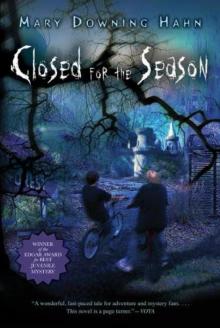 Closed for the Season
Closed for the Season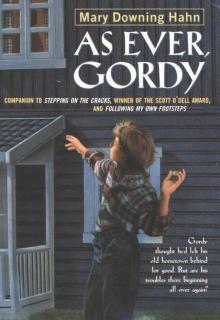 As Ever, Gordy
As Ever, Gordy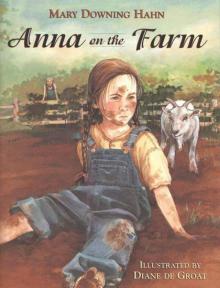 Anna on the Farm
Anna on the Farm The Doll in the Garden
The Doll in the Garden Daphne's Book
Daphne's Book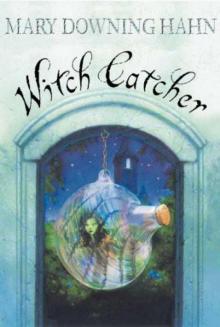 Witch Catcher
Witch Catcher The Gentleman Outlaw and Me--Eli
The Gentleman Outlaw and Me--Eli Wait Till Helen Comes
Wait Till Helen Comes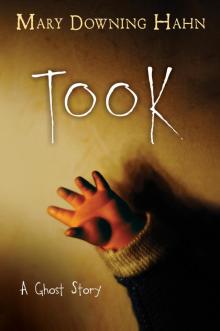 Took
Took A Haunting Collection
A Haunting Collection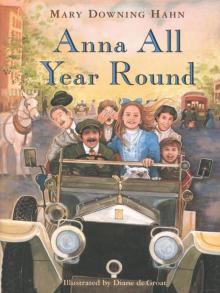 Anna All Year Round
Anna All Year Round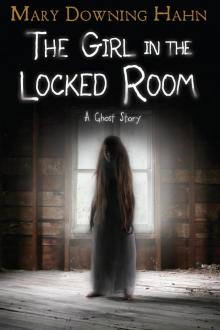 The Girl in the Locked Room
The Girl in the Locked Room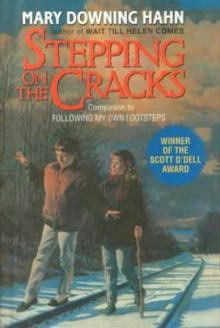 Stepping on the Cracks
Stepping on the Cracks